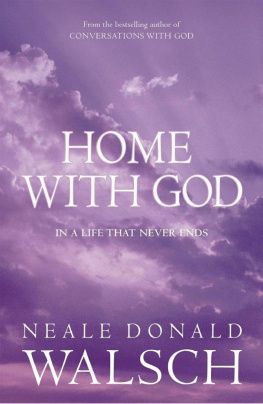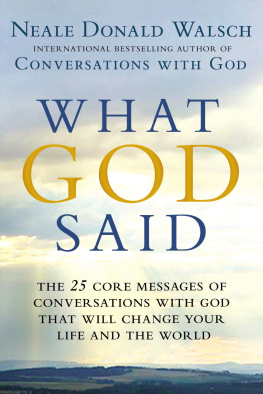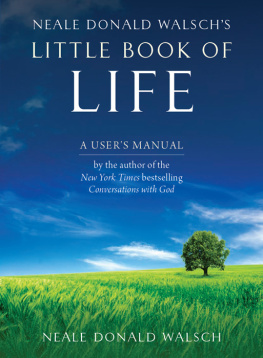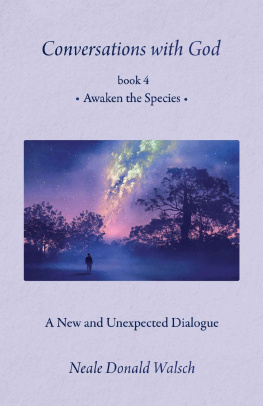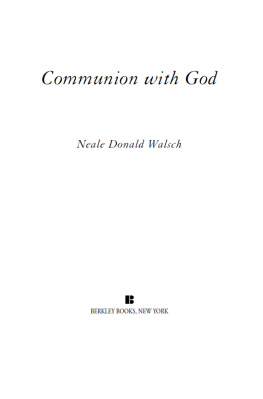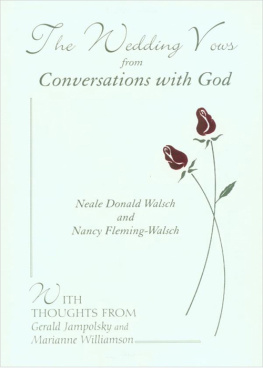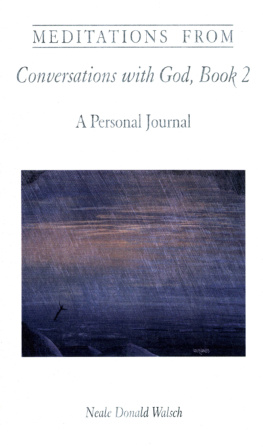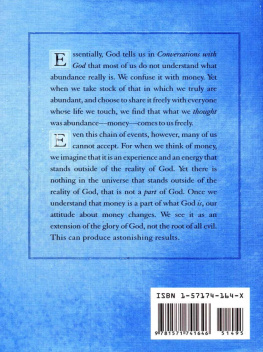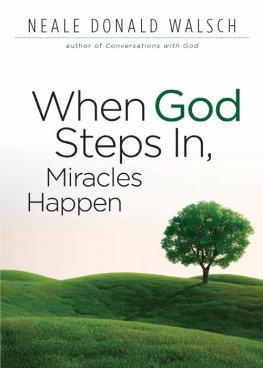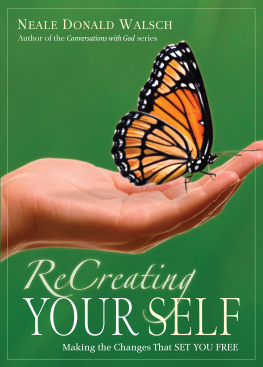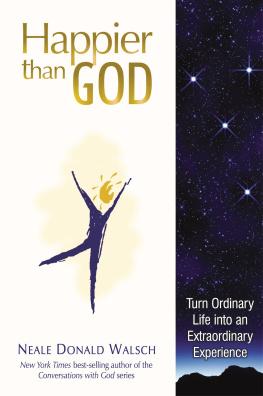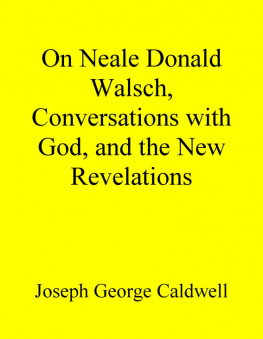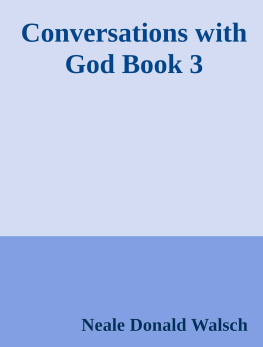Neale Donald Walsch - Home with god : in a life that never ends
Here you can read online Neale Donald Walsch - Home with god : in a life that never ends full text of the book (entire story) in english for free. Download pdf and epub, get meaning, cover and reviews about this ebook. year: 2006, genre: Religion. Description of the work, (preface) as well as reviews are available. Best literature library LitArk.com created for fans of good reading and offers a wide selection of genres:
Romance novel
Science fiction
Adventure
Detective
Science
History
Home and family
Prose
Art
Politics
Computer
Non-fiction
Religion
Business
Children
Humor
Choose a favorite category and find really read worthwhile books. Enjoy immersion in the world of imagination, feel the emotions of the characters or learn something new for yourself, make an fascinating discovery.
- Book:Home with god : in a life that never ends
- Author:
- Genre:
- Year:2006
- Rating:5 / 5
- Favourites:Add to favourites
- Your mark:
- 100
- 1
- 2
- 3
- 4
- 5
Home with god : in a life that never ends: summary, description and annotation
We offer to read an annotation, description, summary or preface (depends on what the author of the book "Home with god : in a life that never ends" wrote himself). If you haven't found the necessary information about the book — write in the comments, we will try to find it.
Home with god : in a life that never ends — read online for free the complete book (whole text) full work
Below is the text of the book, divided by pages. System saving the place of the last page read, allows you to conveniently read the book "Home with god : in a life that never ends" online for free, without having to search again every time where you left off. Put a bookmark, and you can go to the page where you finished reading at any time.
Font size:
Interval:
Bookmark:
HOME WITH GOD by, Neale Donald Walsch INTRODUCTION
This is the word-for-word transcription of a holy conversation. It is a conversation with God about being Home with God. It is the last installment of an extraordinary dialogue covering nearly 3,000 pages in nine books written over eleven years and touching on all aspects of human life.
The present exchange explores many areas of human experience and, at a greater depth than ever before, one area in particular: death and dying, and the life hereafter.
The dialogue at one point journeys into territory lying at the furthest frontier of spirituality: the cosmology of all life. It offers a breathtaking glimpse of Ultimate Reality, presented through metaphor. It reveals in simple, accessible language the reason and purpose for living, ways in which humans may achieve the greatest joy, the nature of the journey upon which humans may achieve the greatest joy, the nature of the journey upon which we are all embarked, and the extraordinary end to that journey--an end that turns out to be not an end at all, but an ecstatic interlude in a glorious and ongoing experience, the full description of which staggers the imagination.
The dialogue here is circular. It springs forward in spirals to astonishing new and never described or imagined places, then springs back to old ground to make sure the next mind-bending exploration begins on solid footing. If you will have patience with this book-- and, by the way, with your lifeit will reward you grandly.
The message of Home with God may be one of the most hopeful and helpful that humanity has ever received.
It is important for you to understand how you came to this conversation. If you think that you came to it by chance, you will have missed the enormity of what is happening to you right now.
Your soul has brought you to this conversation, as it has brought you to every other conversation with God you have ever had, in whatever form. It has contrived to place these pages before you. A myriad of circumstances were, just this moment, interconnected in a precise way at a precise time in
order for you to be gently drawn to the words you find here, and only the intervention of your most holy soul could have produced such events so effortlessly. If you are clear about that, you will hear those words in a different way.
You have been brought here because the Universe understands that you have been quietly calling for answers to the questions all humans ask. What is really going on here in this life, and what will happen when this life is over? Will we be reunited with loved ones whove gone before? Will God be there to greet us? Will it be Judgment Day? Will we be facing the possibility of everlasting damnation? Will we be allowed to squeak into heaven? Will we even know whats going on after we die? Will anything Be going on?
Wrapped in the replies to these inquiries are enormous implications for every human being. Would we live our lives any differently if we actually had those answers? I think we would. Would we be less afraid to live as we were always intended to live--fearlessly and love fully--if we were less afraid to die? I believe the answer is yes.
It hurts my heart to know that so many people feel frightened as they approach their time of passing into the next world, to say nothing of when they are in this one. Life was meant to be a constant joy, and death is a time of ever greater joy, when it would be wonderful if all people could know only peace, and happy anticipation.
Like my mother. She was utterly at peace at her death. The young priest who went in to administer the Last Rites of the Church came out shaking his head. 'She, he whispered.
Mom had an unshakable faith that she was stepping into the arms of God. She knew what life was about and she knew what death was not about. Life was about giving all that you had to all that you loved, without hesitation, without question, without limitation. Death was not about anything closing down, but about everything opening up. I remember that she used to say, When I die, dont be sad. Dance on my grave. Mom felt that God was by her side all during her life--and that this was exactly where God was going to be at her death.
But what of those who imagine that they are living and dying without God? That could be a very lonely life, and a very frightening death. In such a case, it might be better to die without knowing that one is dying at all.
Thats how my father died. He got up from his easy chair one evening, took a single step, and slumped to the floor. The medics arrived within minutes, but it was all over, and Im sure that my father had no thought that those were to be his last moments on earth.
Mom knew she was dying, and I think she allowed herself to know that because she could deal with it peacefully and joyfully. Dad could not, and so he chose to leave abruptly. There was no time to think, Oh, my gosh, Im dying. Im really dying. Similarly, I dont think there were any moments during his eighty-three years when he said to himself, Oh, my gosh, Im really living. Mom knew she was really living every minute. She knew about the wonder and the magic of all of this. Dad did not.
My father was an interesting guy, and his thoughts about God, about life, and about death were a contradiction in terms. More than once he shared with me his total puzzlement about day-to-day occurrences, as well as his utter disbelief in anything at all happening after death.
I recall one striking exchange, two years before he died, in which he was reflecting on his existence. It was not a very long discussion. I had asked him what he thought was the meaning of life. He looked at me almost blankly and said, I dont understand any of it. And when I asked him what he believed happens after someone dies, he replied,
I pressed for more than a one-word answer.
Darkness. An end. Thats all. You go to sleep and you dont wake up.
I was dismayed. An awkward silence followed, and then I rushed to fill the void with all sorts of assurances that surely he was mistaken, that there had to be an extraordinary experience awaiting all of us on the other side. I had begun describing to him what I imagined that was all about when he cut me off with an impatient wave of his hand.
Horseshit, he muttered. And that was that.
I was astonished, because I knew Dad to be a man who, even into his eighties, got down on his knees and said his prayers every night. Who was he praying to, I wondered, if he did not believe in a life that was holy and a death that was only the beginning? And what was he praying about? Maybe he was praying that he, himself, was wrong. Maybe he was hoping against hope.
This book is for all the people who think like my dad, for all those who may be hoping against hope. It is also for those who just dont know what happens after death, and who therefore have very little foundation for understanding more deeply what happens in life, and why. It is for those who are not aware of any formula by which life itself works. It is for those who are puzzled, it is for those who are not puzzled and think that they do know some things about all of this, but who wonder once in a while if they really are right... and it is for those who may simply be scared.
This book is also for those who are not in any of the above groups but who wish to help another who is, and may not know how. What do you say to someone who is dying? How do you comfort those who do on living? What can you tell yourself at these moments? These are not easy questions. So you see, now, why you brought yourself here.
It really IS a miracle that you found this text, you know. A small miracle, perhaps, as miracles go, but a miracle nonetheless. I believe that it is as I have said. I believe your soul drew you to this book out of the same impulse that draws each of us onward to our next step, to our next understanding, and, ultimately, to the Divine.
Next pageFont size:
Interval:
Bookmark:
Similar books «Home with god : in a life that never ends»
Look at similar books to Home with god : in a life that never ends. We have selected literature similar in name and meaning in the hope of providing readers with more options to find new, interesting, not yet read works.
Discussion, reviews of the book Home with god : in a life that never ends and just readers' own opinions. Leave your comments, write what you think about the work, its meaning or the main characters. Specify what exactly you liked and what you didn't like, and why you think so.

